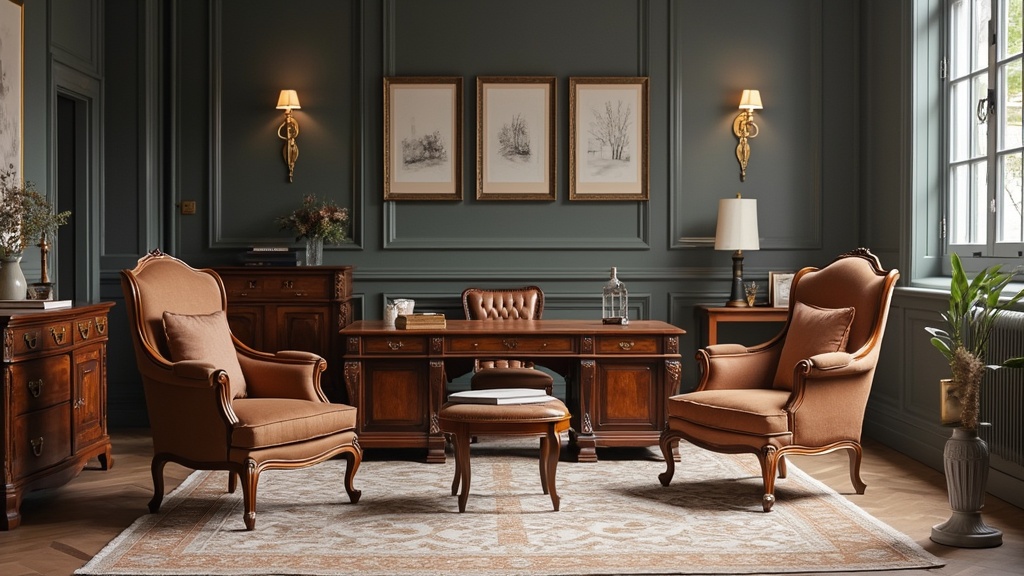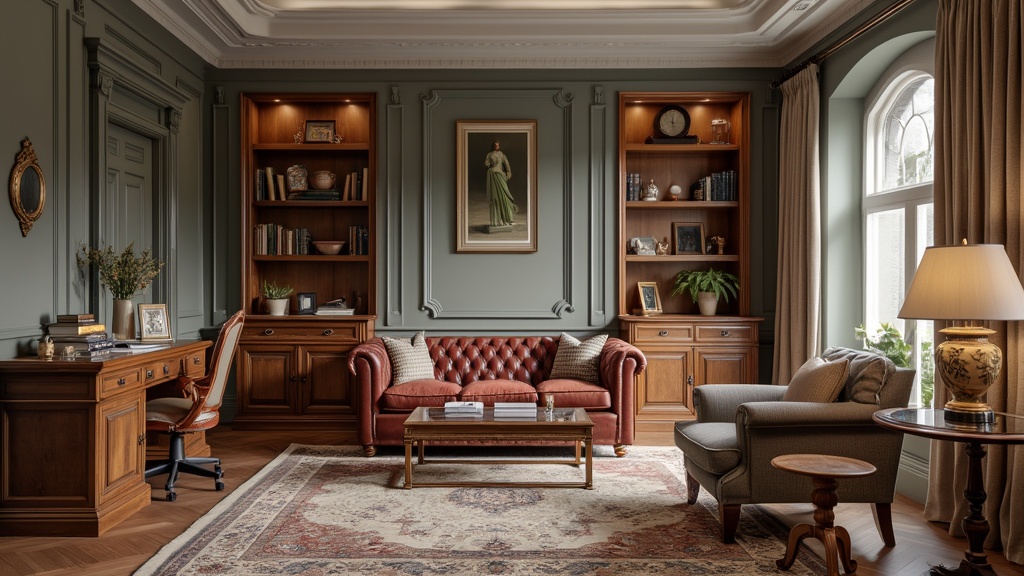The realm of British-inspired furniture blends sophistication with practicality, making it a favorite among homeowners and designers. This style effortlessly combines artisan craftsmanship with elements of contemporary decor, captivating individuals who value tradition intertwined with modernity.
British-inspired furniture wholesale offers a diverse array of artisanal pieces, perfect for transforming living spaces.
Increasing consumer awareness around sustainable practices drives the popularity of eco-friendly materials, ensuring that these stylish furnishings not only enhance visual appeal but also have a positive environmental impact.
Experience how these unique pieces elevate your interior style while embracing timeless designs.
Click here to learn more about: resale certificate connecticut ct
Traditional British Furniture Styles
Exploring the legacy of traditional British furniture unveils a profound history deeply embedded in craftsmanship excellence. The evolution of styles began with the Tudor, Georgian, and Victorian periods, each distinct in furniture design that reflects societal changes.
Notably, materials like oak and mahogany are revered for their longevity and aesthetic appeal, making them fundamental in the creation of enduring furniture. Handcrafted techniques, including joinery and inlay, exemplify the quality craftsmanship intrinsic to traditional British pieces.
Iconic designs such as the Chesterfield sofa and Windsor chair not only serve practical purposes but also act as decorative highlights, showcasing a harmonious blend of artistry and cultural heritage.
Key Characteristics of British Furniture
Defining characteristics of traditional British styles encompass both form and function.
Vintage accents often feature intricate detailing, while the use of luxurious designs and rich fabrics remains prevalent.
Elegant furniture stands the test of time, with pieces designed to complement various interior styles, catering to diverse tastes and preferences. Elements such as wingback chairs and oak tables highlight the blend of comfort and sophistication.
The Significance of Craftsmanship
Significant craftsmanship underpins the authenticity of British furniture, where every piece embodies artisan-made qualities.
The meticulous attention to detail and skilled upholstery choices ensure durability alongside aesthetic value. These handcrafted items often represent bespoke options that resonate with consumers seeking unique items that reflect their personal style.

The Role Of Wholesale Furniture Suppliers
Wholesale furniture suppliers serve as pivotal entities in the dynamic furniture market, acting as intermediaries between manufacturers and retailers. These wholesale suppliers are instrumental in optimizing the logistics of sourcing and distributing furniture, significantly enhancing the availability of stylish furnishings and ensuring pricing efficiency.
Their ability to purchase in bulk empowers retailers to offer competitive pricing to consumers, which is paramount in attracting sales.
Impact on Pricing and Availability
Wholesale suppliers influence pricing structures and product availability in several key ways:.
- Bulk Purchasing: The capacity to buy large quantities enables lower costs that can be passed on to retailers.
- Logistics Efficiency: Streamlined distribution processes ensure that trends and seasonal demands are met promptly.
- Product Selection: A diverse range of offerings allows retailers to cater to various customer preferences, from traditional styles to contemporary decor.
A successful partnership between a local manufacturer of vintage-inspired pieces and a wholesale supplier resulted in a 30% sales increase within six months.
This example highlights how collaborations can foster innovative offerings, ensuring that both traditional styles and contemporary decor are readily accessible in the market. Such partnerships create a synergy that benefits both suppliers and retailers, encouraging the proliferation of unique items that enhance the overall consumer experience.
Crafting Custom Furniture Solutions For Clients
Consumer demand for personalized furniture solutions has surged, necessitating a shift towards customization in furniture design. Retailers increasingly recognize that bespoke options not only fulfill unique client requirements but also significantly enhance customer satisfaction and loyalty.
Benefits of Personalization
Personalized furniture solutions offer numerous advantages:.
- Enhanced Satisfaction: Tailored designs meet specific client needs, leading to higher satisfaction ratings.
- Stronger Relationships: Custom solutions foster long-term partnerships between clients and retailers.
- Market Differentiation: Unique offerings help retailers stand out in a competitive market.
One notable project involved a client seeking chesterfield sofas specifically tailored to align with a distinctive interior style. The supplier produced handcrafted pieces that resonated with the client’s aesthetic vision, culminating in a remarkable 95% satisfaction rating. Such successful customization not only elevated the client’s living space but also solidified a lasting relationship, paving the way for future collaborations and valuable referrals.
Wholesale Furniture Suppliers
- Wholesale suppliers can reduce costs for retailers by up to 20% through bulk purchasing.
- Efficient logistics can decrease delivery times by 30%, ensuring timely availability of trending items.
- Retailers that offer a diverse product selection can increase customer retention rates by 15%.
- Custom furniture solutions can lead to a 25% increase in customer referrals and repeat business.
Exploring EcoFriendly Materials In British Furniture Design
Innovative approaches to furniture design increasingly emphasize eco-friendly materials, essential for sustainable practices. One standout option is reclaimed wood, which not only offers environmental benefits but also brings a unique history that enhances the aesthetic appeal of furniture.
Another promising choice is bamboo, known for its rapid growth and renewability, making it a favorite among eco-conscious consumers.
Natural fabrics such as organic cotton and hemp serve as low-impact alternatives to synthetic fibers.
Sourcing these ecofriendly materials is a vital step for brands aiming to differentiate themselves in the competitive wholesale furniture market.
To ensure sustainability, consider the following tips when sourcing:.
- Research local suppliers who specialize in sustainable practices.
- Verify proper certifications, such as FSC, to uphold sustainability standards.
- Explore partnerships with manufacturers who prioritize eco-friendly processes.
How Artisan Craftsmanship Enhances Furniture Value
The uniqueness of crafted pieces directly boosts their perceived value in the furniture market. Handmade processes guarantee meticulous attention to detail and exceptional quality, often translating into higher prices due to their distinctiveness. Traditional British techniques like marquetry and fine upholstery add to the unique charm of handcrafted pieces.
“Connecting buyers with the artisans behind their furniture creates a compelling value proposition. ”
Highlighting artisan craftsmanship in marketing can significantly enhance brand awareness. Consider these strategies to showcase craftsmanship effectively:
- Utilize storytelling to illustrate the artisans’ journeys and their dedication to quality.
- Incorporate engaging visual content that demonstrates intricate craftsmanship.
- Encourage customer testimonials that emphasize the uniqueness of artisan-made items.
Eco-Friendly Furniture Design
- Reclaimed wood reduces deforestation and minimizes waste by repurposing existing materials.
- Bamboo can grow up to 35 inches in a single day, making it one of the fastest-growing plants on Earth.
- Organic cotton uses 91% less water than conventional cotton, making it a more sustainable fabric choice.
- FSC certification ensures that wood products come from responsibly managed forests, promoting environmental stewardship.
Seasonal Trends In British-Inspired Furniture Decor
Incorporating seasonal trends significantly enhances British-inspired furniture collections.
Spring marks a shift towards floral patterns and light colors, with pastel hues invigorating living spaces like never before.
As summer approaches, prioritizing outdoor furniture becomes essential; including durable, weather-resistant pieces like garden benches captures ongoing consumer interest effectively.
These seasonal demand shifts can impact wholesale buying patterns dramatically, aligning product selection with evolving consumer preferences.
Retailers can elevate aesthetic appeal by adapting collections to reflect seasonal motifs, thus driving increased sales opportunities during events such as trade shows or furniture expos.
Marketing Strategies For British Furniture Distribution
Connecting marketing strategies ensures successful engagement with target demographics in British furniture sales.
Social media marketing platforms like Instagram and Pinterest serve as powerful tools for visual storytelling. They effectively showcase customer testimonials featuring traditional styles as focal points in campaigns.
Email marketing plays a major role; sending out seasonal newsletters fosters ongoing relationships with customers as well.
An actionable marketing tip for rapid implementation includes launching limited-time campaigns focused around urgency, driving immediate consumer interest.
Offering bespoke options or unique items not only increases brand loyalty but also enhances visibility within crowded markets.
- Floral patterns and pastel colors are trending in spring, appealing to consumers looking for fresh decor.
- Outdoor furniture sales peak in summer, with durable materials like weather-resistant wood or metal being highly sought after.
- Retailers adapting to seasonal trends can see a significant increase in sales during key events like trade shows.
- Social media platforms are essential for showcasing traditional styles and customer testimonials, enhancing brand engagement.
Engaging With Interior Decorators And Influencers In Furniture
Connecting with interior decorators and influencers significantly enhances your furniture brand’s visibility and reach. This collaboration not only strengthens brand awareness but also opens access to niche markets where traditional methods may fall short.
By focusing on personalized outreach efforts, brands can increase response rates and foster meaningful connections.
Strategies for Effective Engagement
To effectively engage with decorators and influencers, consider the following strategies:.
- Research potential partners: Identify decorators and influencers whose styles align with your target audience’s preferences. This ensures a good fit for your brand’s aesthetic, whether it involves contemporary decor or traditional styles.
- Craft a compelling pitch: Clearly communicate the advantages of collaboration for both parties, emphasizing unique items like artisan-made furniture or durable materials.
- Utilize social media: Build relationships on platforms favored by your target influencers, engaging with their content to foster rapport before initiating direct outreach.
- Follow up strategically: Schedule timely follow-ups to express genuine interest, demonstrating your commitment without being intrusive.
Successful Campaign Example
A notable campaign highlighting the impact of influencer partnerships featured a prominent interior decorator showcasing bespoke options. This collaboration led to elevated engagement levels and increased sales, demonstrating how authentic relationships can transform marketing strategies within the furniture industry. By tapping into the decorator’s audience, the brand effectively increased its reach and embraced customization options, which appealed to potential clients seeking quality craftsmanship.
Engaging With Decorators and Influencers
- Brands that collaborate with influencers can see up to a 37% increase in brand awareness.
- Personalized outreach can lead to a 20% higher response rate compared to generic pitches.
- Influencer marketing can generate 11 times the ROI compared to traditional advertising methods.
- Over 70% of consumers trust peer recommendations over traditional advertising, making influencer partnerships more effective.



